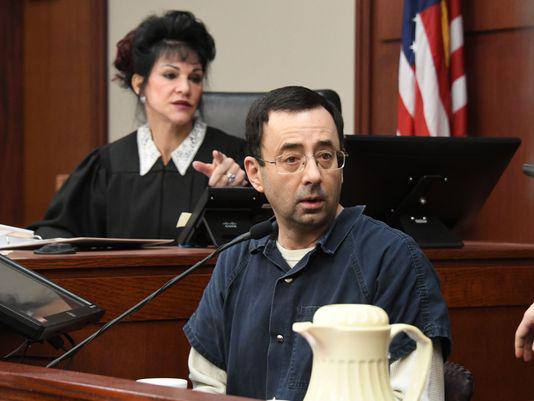|
Judge: Aquilina can hear Nassar appeal
By Kim Kozlowski
Ingham Circuit Judge Rosemarie Aquilina was not biased toward serial pedophile Larry Nassar and should stay on the case as he appeals the sentence, a judge ruled Tuesday. But one of Nassar's attorneys said she will appeal Chief Judge Richard Garcia's decision. Garcia wrote in a seven-page opinionthat Nassar created his situation: he pleaded guilty to criminal sexual conduct involving seven young girls, using his medical credentials to assault them, and admitted his procedures served no medical purpose and were for his own sexual gratification. Garcia also said that Nassar agreed to allow more than the seven named survivors to provide impact statements at sentencing, resulting in more than 150 women and girls coming forward. "The die was cast in the courtroom and defendant's sentence was forged by his own words and deeds," Garcia wrote. "Consideration of whether he should be resentenced can be fairly reviewed by the judge uniquely situated to provide justice in this case. The judge who heard these survivors is the only one who should properly render any re-sentence." Malaika Ramsey-Heath, a lawyer with the State Public Defender Office who is representing Nassar in his appeal, said she and her colleagues were discussing their next steps but declined to elaborate. Reacting to Garcia's decision, she said, "It's not unexpected but disappointing." She, along with attorney Jacqueline McCann, filed the motion for Aquilina to recuse herself as part of a multi-faceted approach to appeal the amount of prison time he was handed by three judges, and change the sentences from running consecutively to concurrently. The first step of Nassar's appeal was asking Aquilina to recuse herself from Nassar's appeal, arguing that she was not impartial when she handed him a prison sentence of 40-175 years for first-degree criminal sexual conduct in Ingham County. They argued that Aquilina used the hearing to advance her agenda of advocacy for state and national policy initiatives and culture change around sexual discrimination and gender inequity. Nassar's attorneys also noted that after Aquilina sentenced Nassar in January she said she would not grant any media interviews until the appeal period had expired, but she gave an interview to The Detroit News, saying she supports Nassar's victims. They also pointed to Aquilina's presence last month in Los Angeles during the ESPY awards, where nearly 150 young women who accused Nassar of abuse accepted the Arthur Ashe Courage Award. Earlier this month, Aquilina refused to recuse herself from hearing Nassar's appeal of the prison sentence she gave him for criminal sexual conduct, rejecting claims that she demonstrated bias against him. Ramsey-Heath and McCann appealed Aquilina's decision to Garcia. Citing case law, Garcia wrote that consideration of victim impact statements by those who testified at sentencing does not amount to "a prejudice or bias that give rise to disqualification." "In fact, the language of punishment need not be nice," Garcia wrote. "Judge Aquilina clearly understood the importance of righteous indignation. She also understood the role of the court to have this emotion controlled by the judge rather than allow it to run wild in the community. She explained that as she expressed her indignation, there was a palpable decrease in the tension in the gallery. This was a controlled burn." Additionally, Garcia wrote, experts agree that the value of the sentencing phase to the survivors is not limited to giving them a voice, likening it as balm for the soul. "The survivors not only wanted to speak, but also needed to be heard and know that the people stand with them," Garcia wrote. "Had Judge Aquilina discharged her duty of office 'without rhetoric' and dispassionately and blandly admonished the defendant in polite terms, the survivors who poured their pain onto the record would have left feeling that their voices were again being ignored by the state. The judge acknowledged that 'the system has failed you.' These survivors were ignored by defendant's employer, Michigan State University, but were heard by the judiciary." Garcia noted that Nassar's argument boils down to two statements. "First, he believes the judge should not have said that she had just signed his 'death warrant,' " Garcia wrote. "This explained the fact that the sentence would run consecutively to his 60-year federal sentence for possession of child pornography and that defendant was going to live the rest of his life in prison." The other argument, Garcia wrote, is that Nassar objects to the judge's explanation that our constitutional republic does not allow for cruel and unusual punishment. During trial, Aquilina commented that the nation's constitution does not allow for cruel and unusual punishment and Michigan doesn't have the death penalty. "Defendant jumps to the conclusion that the judge is advocating for such cruel and unusual punishment," Garcia wrote. "Her comments simply attempted to impress upon the defendant his good fortune that he was protected by our Constitution. They also communicated to the survivors that she understood the depth of society's visceral natural desire for vengeance. However, the judge warned that an 'eye for an eye' 'solves nothing' and that vigilante crime is not tolerated. Such passionate elocution is not the basis of disqualification. "The expression of emotion in the courtroom at times such as this must be allowed to be expressed and validated." Nassar is serving his federal sentence for possession of child pornography in the U.S. Penitentiary, Tucson, a high-security prison in Arizona. He also has a 40-125-year sentence for three counts of first-degree criminal sexual conduct from Eaton County. Contact: kkozlowski@detroitnews.com
|
.
Any original material on these pages is copyright © BishopAccountability.org 2004. Reproduce freely with attribution.
